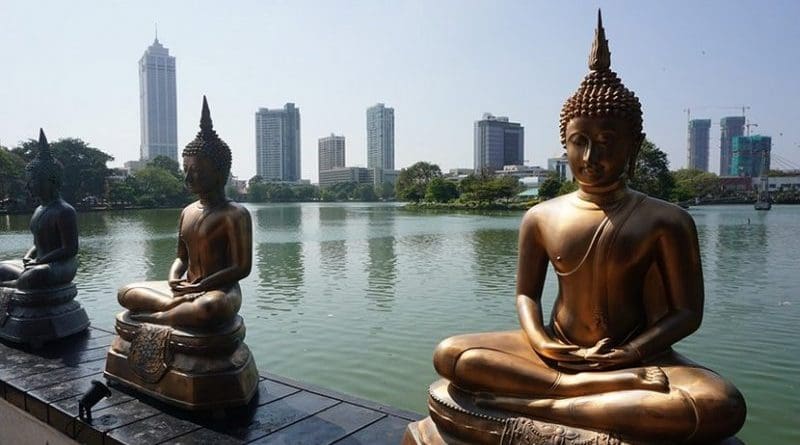Sri Lanka: Political Stability Restored, But Food And Law And Order Pose Challenges – Analysis
After nearly two months of uncertainty and turmoil, Sri Lankan parliamentarians have now reached a consensus on the political management of the country, with Ranil Wickremesinghe taking over as Prime Minister and attempting to form a multi-party government.
On Friday, nine new cabinet ministers from different parties were sworn in before President Gotabaya Rajapaksa. The new ministers are: Nimal Siripala de Silva (Ports, Shipping and Aviation Services); Dr. Susil Premajayantha (Education); Dr. Keheliya Rambukwella (Health); Dr. Wijeyadasa Rajapakshe (Justice, Prisons Affairs and Constitutional Reforms); Harin Fernando (Tourism and Lands); Dr. Ramesh Pathirana (f Plantation Industries); Manusha Nanayakkara (Labor and Foreign Employment); Nalin Fernando (Trade, Commerce and Food Security); Tiran Alles (Public Security).
But what Sri Lanka’s 21 million people are likely to face in the near future is far more grave – an unprecedented food shortage and growing lawlessness or anarchy fomented by radical groups exploiting the people’s grievances over shortages of fuel, food and high prices of essentials.
There are reports from various parts of Colombo about gangs, led by local thugs and suspected members radical outfits, stopping buses and preventing people from going to work. With the government still undecided on how to tackle public protests, the police stand idly by as unruly elements impose their will on hapless citizens wanting to go to work to eke out a living under trying circumstances. Although there is a State of Emergency which allows the government to call in the army to aid civil power, the issue is considered to be too sensitive in the current politically charged atmosphere.
Meanwhile the Government Medical Officers Association has threatened to go on strike if a salary cut is ordered. This will only add to the misery of patients who are already facing a shortage of essential drugs in the hospitals and the market. The government doctors had threatened to strikes over salary cuts even as the Prime Minister told parliament that his cabinet will forgo salaries and other perks.
The last one-day all-Island strike cost Sri Lanka US$ 22 million in exports and the burning of buses by agitators on May 9 had caused a loss of SLR 400 million (US$ 1.1 million). Sri Lanka imports buses from India but the usable foreign exchange in the country amounts to only US$ 50 million, according to the former Finance Minister Ali Sabry.
Food Crisis
On Thursday, in a speech in parliament, Prime Minister Wickremesinghe warned people to face food shortages in the coming months and said the Cabinet has discussed a program to commence food cultivation to cover all areas of the country. He said food scarcity is already affecting people, particularly in the Colombo District, and that prompt action must be taken to provide them with relief. All unused State land will be allocated for the purpose, he added.
The Prime Minister recalled that US Treasury Secretary Janet Yellen had said that Sri Lanka has been identified along with Afghanistan as a country that will need food assistance. The “International Food Initiative’s (IFI) Action Plan to Address Food Insecurity” developed by the Asian Development Bank (ADB), World Bank (WB) and several other multilateral and United Nations agencies, envisages the spending of billions of dollars on supporting farmers, he said.
However, while Sri Lanka receives international assistance, the country will have to prepare to ensure food security for all, Wickremesinghe said and added that steps have been taken to provide adequate fertilizer to farmers for the next “Maha” harvesting season.
According to the International Trade Administration, the agriculture sector contributes about 7.4 % of Sri Lanka’s GDP, out of which, the fisheries sector contributes around 1.3% and the livestock sector accounts for 0.9%. Over 30% of Sri Lankans are employed in the agricultural sector.
“Although Sri Lanka is a fertile tropical land with the potential for the cultivation and processing of a variety of crops, issues such as productivity and profitability hamper the growth of the sector. There is a lack of private investment in agriculture due to uncertain policies,” ITA said.
Sri Lanka depends substantially on food imports. The importation of food and beverages accounted for 9.7% of total imports in 2020 with total agriculture, food, and beverage imports reaching $1.6 billion, ITA added.
The overnight ban on chemical fertilizers in 2021, in the midst of the pandemic, hit Sri Lankan farmers below the belt. It severely curtailed production. According to Nikkei Asia, this year’s Maha season which ended in March, was to see 30% less production less than the normal yield of 3.2 million tons.
“A kilogram of tomatoes that sold for 149 Sri Lankan rupees (80 cents) in December 2020 was going for 463 rupees a year later. Similar spikes are mirrored in the prices for green chilies, garlic, onions and coconuts — essentials for spicy dishes that accompany increasingly expensive Sri Lankan short-grain rice,” Nikkei Asia noted. Food inflation rose to 21%.
Nikkei Asia quoted the World Bank has said that at $3.20 per day as the poverty threshold for Sri Lanka. By this yardstick 500,000 more people had fallen into poverty, with the majority in rural areas, where 92% of the poor live. The current estimate of the number of poor in Sri Lanka is 2.56 million out of 21 million.
New York-based ratings agency Fitch has downgraded debt-ridden Sri Lanka’s sovereign rating to “restricted default” after the country defaulted on making international sovereign bond payments at the end of the 30-day grace period. The downgrade comes at a time when the Central Bank Governor P Nandalal Weerasinghe conceded on Thursday that Sri Lanka won’t be able to pay back its debts until it restructures them.
Meanwhile, the government has told its non-essential staff to stay at home due to the petrol and diesel shortage. MPs have asked the parliament Speaker to give them accommodation in hotels as they cannot reach parliament from their homes in the absence of transport fuel.

